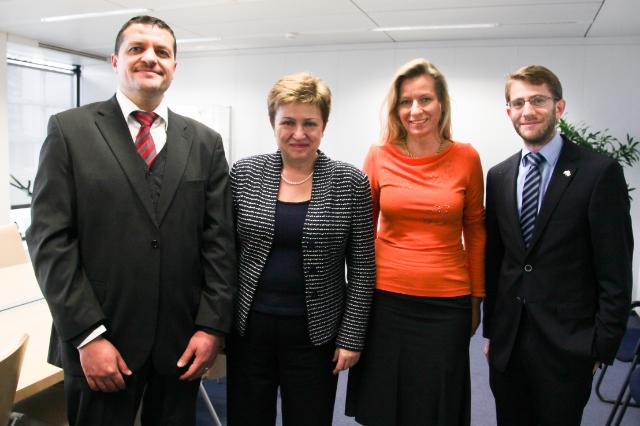On Tuesday 20th March 2013, CEPR was welcomed by the EU’s Commissioner for International Cooperation, Humanitarian Aid and Crisis Response. CEPR met with Commissioner Georgieva to present a report on our recent Parliamentary mission to Lebanon, and to discuss what the EU can do to assist Palestinian refugees affected by the crisis in Syria.

CEPR was represented by Board of Trustee members Mazen Kahel and MEP Alexandra Thein, and CEPR’s Parliamentary Officer James Tuite.
Around 455,000 refugees are registered with UNRWA (the United Nations Relief and Works Agency) in Lebanon. As a result of the on-going violence in Syria, Lebanon has received over 30,000 additional Palestinian refugees. UNRWA is stretched beyond its capacity, and urgently needs additional funds to cope with this humanitarian disaster. Palestinian refugees in Lebanon are politically marginalised, denied basic social and economic rights, and are trapped in squalid camps with limited and insufficient resources. Most refugees rely entirely on UNRWA as the sole provider of education, health and relief, and social services. CEPR expressed its concern that the plight of Palestinian refugees was being marginalised in the broader context of Syrian refugees. Commissioner Georgieva recognised these concerns, and assured CEPR that she would continue to raise this important issue within the Commission. CEPR also discussed what the EU can do to assist Palestinian refugees beyond providing additional monetary aid. Talks included; making it easier for students with scholarships to be granted visas in the EU, applying pressure on Lebanon to ease Palestinian housing restrictions and to allow Palestinian refugees to work (they are currently prohibited from working outside the camps and in over 70 professions), and what the EU can do to protect Palestinians inside Syria. CEPR’s full report on its February delegation to Lebanon can be found on our website. A briefing paper on Palestinian refugees in Syria, Lebanon, and Jordan is also available.


